- Home
- John le Carré
The Mission Song Page 17
The Mission Song Read online
Page 17
Our flight deck, regarded by many as an aircraft's sanctum, was cordoned off with frayed ribbon. Our two pilots, middle-aged, overweight and unshaven, were so busy ignoring their passengers that you might well have asked whether they knew they had any. Add to that a chain of blue corridor lights evocative of a certain North London hospital and it was little wonder if my sense of high purpose should give way to the internal journeys I was making on the newly opened shuttle between Penelope and Hannah.
Within minutes of take-off our team, almost to a man, had fallen victim to African sleeping sickness, using their kitbags for pillows. Two exceptions were Maxie and his French friend who, huddled together at the aft end of the plane, were swapping sheets of paper like an anxious couple who have received a threatening communication from the mortgage company. The Frenchman had removed his beret, exposing an aquiline face, penetrating eyes and a tonsured pate fringed with strawcoloured hair. His name, which I extracted from the laconic Benny, was Monsieur Jasper. What Frenchman was ever called Jasper? I asked myself incredulously. But perhaps like me he was travelling under an alias.
“Do you think I should go over and offer them my services?” I asked Anton, suspecting that the two were having difficulty communicating.
“Governor, if the skipper wants your services, the skipper will take them,” he replied, without lifting his head from his magazine.
Of the remaining members of our team, save one, I can give no account. I remember them as a grim-jawed group in bulked-out anoraks and baseball caps who stopped talking whenever I drew close.
“Wife problems sorted, old boy? Chaps round here call me Skipper — by the by.”
I must have been dozing, for when I looked up I found myself staring into the magnified blue eyes of Maxie as he squatted Arab-style at my elbow. My spirits instantly revived. How many times had I not listened to Brother Michael regaling me with the feats of arms performed by Colonel T. E. Lawrence and other great Englishmen at war? With the touch of a magician's wand the interior of our plane transformed itself into an Arab nomad's tent. The overhead webbing became our goatskin roof. In my imagination, desert stars were peeping through the gaps.
“Wife well and truly sorted, thank you, Skipper,” I replied, suiting my energetic manner to his. “No further problems in that department, I'm pleased to say.”
“How about that ailing chum of yours?”
“Oh, well, he died actually,” I replied with equal casualness.
“Poor bugger. Still, no point in hanging around the back of the herd once your time's up. You a Napoleon buff?”
“Well, not exactly,” I replied, reluctant to admit that Cromwell, Our Chief of Men was as far as my historical researches had advanced.
“By the time he got to Borodino, he'd lost the plot. Sleepwalking at Smolensk, gaga by the time he got to Borodino, fucked at forty. Couldn't piss, couldn't think straight. Gives me three more years. How about you?”
“Well, twelve actually,” I replied, privately marvelling that a man with no French should appoint Napoleon his role model.
“It's a quickie. Anderson tell you that?” He ran on, not waiting for my answer. “We tiptoe in, talk to a few Congolese chaps, cut a deal with 'em, get their signatures on a contract, tiptoe out. We've got 'em for six hours tops. Each of 'em has said yes separately, now we've got to get 'em to say yes to each other. Officially they're somewhere else, and that's where they've got to be by the time the clock chimes midnight. With me?”
“With you, Skipper.”
“This is your first gig, right?”
“I'm afraid it is. My baptism of fire, you might say,” I conceded, with a rueful smile to indicate that I was alive to my drawbacks. And, unable to restrain my curiosity: “I don't suppose you'd like to tell me where we're going, would you, sir?”
“Little island up north where no one will disturb us. Less you know now, better you'll sleep later.” He allowed himself a slight softening of his features. “Every time the same with these jobs. ‘Hurry up and wait’, then ‘Where the fuck are you?’ Next thing you know, there are ten other arseholes in the race, your chaps are scattered across the globe and your back tyre's got a puncture.”
His restless gaze lighted on a column of suitcase-style boxes, black-painted and of uniform size, tethered to a grid beside the cabin door. At their base, curled up on his mattress like a newborn calf, lay a gnomic man in a flat cloth cap and quilted waistcoat, to all appearances as sound asleep as his comrades.
“Any of that junk actually work, Spider?” Maxie demanded, raising his voice to carry across the width of the fuselage. The gnome, no sooner addressed, vaulted to his feet acrobat-style, and stood comically to attention before us.
“Shouldn't think so, Skip. Load of old rubbish, by the looks of it,” he replied cheerfully, in what my top interpreter's ear instantly identified as a Welsh intonation. “With twelve hours to cobble it together, what do you expect for your money?”
“What have we got to eat?”
“Well now, Skip, since you ask, an anonymous donor has very kindly sent this Fortnum's hamper, you see. Or I think he's anonymous, because search where you will regardless, there's not a sender's name to be found anywhere, not so much as a card.”
“Anything inside it?”
“Not a lot, frankly, no. A whole York ham, I suppose. About a kilo of foie gras. A couple of sides of smoked salmon, a fillet of cold roast beef, cheesy Cheddar biscuits, magnum of champagne. Nothing to whet the appetite, not really. I thought of sending it back.”
“Have it on the way home,” Maxie ordered, cutting him short. “What else is on the menu?”
“Chow mein. Luton's best. Should be nice and cold by now.”
“Dish it up, Spider. And say hello to the languages here. Name of Brian. On loan from the Chat Room.”
“The Chat Room, eh? Well, that takes me back, I will say. Mr Anderson's sweat shop. He's still a baritone, is he? Not castrated or anything?”
Spider, as I now knew him, smiled down on me with his boot-button eyes and I smiled back at him in the confidence of having another friend in our great enterprise.
“And you can do military,” Maxie announced, extracting from his gasmask case an old tin flask clad in khaki cloth and a packet of Bath Oliver biscuits. The flask, I later learned, contained Malvern water.
“What military were we thinking of, Skipper?” I countered. My chow mein was cold and gluey, but I was determined to make a good fist of it.
“Weaponry, ordnance, firepower, calibre, all that crap,” taking a bite of his Bath Oliver biscuit.
I assured him that, thanks to my experience of the Chat Room, I was familiar with a range of technical and military terms. “But basically what happens, where there's no vernacular equivalent, is they filch it from the nearest colonial language,” I added, getting into my stride. “Which, in the case of a Congolese, would naturally mean French.” And, unable to restrain myself, “Unless of course they've been Rwandan or Ugandan trained, in which case you'll get some purloined English, such as Mag, or Ambush, or RPG.”
Maxie appeared no more than politely interested. “So a Munyamulenge rabbiting away to a Bembe would talk about a semi-automatique so to speak?”
“Well, assuming they could talk to each other at all,” I replied, keen to show off my expertise.
“Meaning what, old boy?”
“Well, for instance, a Bembe might speak Kinyarwanda, but not be able to make the total bridge to Kinyamulenge.”
“So what do they do?” — wiping his wrist across his mouth.
“Well, basically, they'd have to muddle through on whatever they had in common. Each would understand the other — to a point, but not necessarily all the way.”
“So after that?”
“They might do a bit of Swahili, a bit of French. It depends what they've got, really.”
“Unless they happen to have you around, that it? You speak 'em all.”
“Well, in this case, yes,” I replied
modestly. “I wouldn't impose, naturally. I'd wait to see what was needed.”
“So whatever they speak, we speak it better. Right? Well done us,” he mused. But it was clear from his tone that he wasn't as satisfied as his words suggested. “Question is, do we need to tell 'em all that? Maybe we should play it canny. Keep our hardware under wraps.”
Hardware? What hardware? Or was he still talking about my proficiency in military matters? I cautiously voiced my confusion.
“Your hardware, for Christ's sake. Your arsenal of languages. Every child knows a good soldier doesn't advertise his strength to the enemy. Same with your languages. Dig 'em in and keep the tarps over 'em till you need to wheel 'em out. Common sense.”
Maxie, I was beginning to discover, possessed a dangerous and beguiling magic. Part of this magic was making you feel that his most outlandish plan was the normal one, even if you had yet to discover what his plan entailed.
“Try this one for size,” he suggested, as if offering me a compromise that would satisfy my over-exacting standards. “Suppose we put it out that you speak English, French and Swahili and call it a day? That's more than enough for anybody. And we keep your little ones to ourselves. How would that grab you? Different kind of challenge for you. New.”
If I had understood him correctly, it wouldn't grab me in the least, but that wasn't quite what I replied.
“In what context exactly, Skipper — in what circumstances might we be saying that? Or not saying it,” I added, affecting what I hoped was a wise smile. “I don't mean to be pedantic, but who would we be saying it to?”
“To everyone. Whole room. In the interests of the op. To help the conference along. Look.” He made one of those pauses that professionals make when they're trying to explain something to a simpleton. In my time, I'll admit, I have been guilty of the same presumption. “We have two Sinclairs” — holding out his bulletproof palms, one for each of me — “Sinclair above the waterline” — raising the left palm — “and Sinclair below the waterline” — dropping the right palm into his lap. “Above the line, tip of the iceberg, you speak French and variations of Swahili only. Plus English to your chums, obviously. Which is normal rations for any middle-of-the-list interpreter. With me?”
“With you thus far, Skipper,” I affirmed, striving to evince enthusiasm.
“And below it” — I was now staring downward at his right palm — “the remaining nine-tenths of the iceberg, which is all the other stuff you speak. You could play that one out, couldn't you? Not all that difficult, once you've got a grip on yourself.” Taking back his hands, he treated himself to another biscuit while he waited for me to see the light.
“I still don't think I'm completely there, all the same, Skipper,” I said.
“Don't be a tart, Sinclair, of course you are! It's dead simple. I walk into the conference room. I introduce you.” He did so, in excruciating French, while he masticated his biscuit: “‘Je vous presente Monsieur Sinclair, notre interprete distingue. Il parle anglais, francais et Swahili.’ And Bob's your uncle. Anyone who looses off in another language within your hearing, you don't understand 'em.” My facial expression, despite my best efforts, was still not to his liking. “For Christ's sake, man. It's not such a big deal, acting dumb. Chaps do it every day without even trying. That's because they are dumb. Well, you're not. You're fucking brilliant. Well, be brilliant. Young strong chap like you, it's a doddle.”
“So when do I get to use my other languages, Skipper? The ones you call below the waterline,” I persisted.
The languages I'm proudest of, I was thinking. The languages that separate me from the pack. The languages that in my book are not submerged at all, but triumphantly salvaged. The languages, if you're me, that should be paraded for all to hear.
“When you're told to and not before. You're under sealed orders. Part one today, part two in the morning, soon as we get final confirmation that the show's on the road.” Then to my relief his rare smile came up, the one you'd cross deserts for. “You're our secret weapon, Sinclair. Star of the show and don't forget it. How many times in life does a fellow get a chance to give a shove to history?”
“Once if he's lucky,” I rejoined loyally.
“Luck's just another word for destiny,” Maxie corrected me, his Bogey-like eyes gleaming mystically. “Either you make your own or you're screwed. This isn't some candy-arsed training caper. It's delivering democracy at the end of a gun barrel to the Eastern Congo. Get the right groundswell going, give 'em the right leadership, and the whole of Kivu will come running.”
My head was swirling from this first glimpse of his great vision and his next words spoke straight into my heart — and Hannah's.
“Greatest sin committed by the big players in the Congo till now has been indifference, right?”
“Right,” I replied heartily.
“Intervene if you can make a fast buck, get the fuck out ahead of the next crisis. Right?”
“Right.”
“The country's in stasis. Useless government, chaps sitting around waiting for elections that may or may not happen. And if they do happen, will likely as not leave 'em worse off than before. So there's a vacuum. Right?”
“Right,” I echoed yet again.
“And we're filling it. Before any of the other buggers do. Because they're all at it, the Yanks, the Chinese, the French, the multinationals, the lot. Trying to get in before the elections. We're intervening, and we're staying. And this time, it's the Congo itself that's going to be the lucky winner.”
I attempted yet again to voice my appreciation of all that he had said, but he rode through me.
“Congo's been bleeding to death for five centuries,” he went on distractedly. “Fucked by the Arab slavers, fucked by their fellow Africans, fucked by the United Nations, the CIA, the Christians, the Belgians, the French, the Brits, the Rwandans, the diamond companies, the gold companies, the mineral companies, half the world's carpetbaggers, their own government in Kinshasa, and any minute now they're going to be fucked by the oil companies. Time they had a break, and we're the boys to give it to 'em.”
His restless eye had switched to Monsieur Jasper at the other end of the fuselage, who was holding up his arm in the manner of the checkout clerk at our Battersea mini-market when she hasn't got enough pound coins.
“Part two of your sealed orders tomorrow,” he announced and, grabbing his gasmask case, struck off down the aisle.
• • •
When you're under Maxie's spell your brain gets anaesthetised. Everything he had said was music to my bi-cultural ear. But coming round, I began to hear less compliant voices than my own making themselves audible above the irregular throbbing of the plane's engines.
I had said “Right.” Had I said yes?
I hadn't said no, so presumably I had.
But yes to what, exactly?
Had Mr Anderson informed me, when handing me my job description, that it involved turning myself into a linguistic iceberg with nine-tenths of me below the waterline? He had not. He had said he had a bit of live action for me, and he was sending me into the field where I would be living a lie and not the Bible truth that we had been brought up to. Of waterlines and controlled schizophrenia not one word.
Don't be a tart, Sinclair, it's dead simple. Simple how, please, Skipper? Pretending you've heard something when you haven't is relatively simple, I would concede that. People get away with it every day. Pretending you haven't heard something when you have, on the other hand, is in my perception the reverse of simple. Your top interpreter responds without premeditation. He is trained to leap in. He hears, he leaps, the art follows. All right, granted: he will in due course reflect. But the talent comes in the instant response, not in the rehash.
I was still meditating along these lines when one of our unshaven pilots yelled at us to hang on tight. As if hit by gun fire, the plane winced, winced again, and bounced ponderously to a halt. The cabin door banged open, a blast of chill air made me gratefu
l for my Harris Tweed. Our skipper was first to vanish into the void; next went Benny with his kitbag, followed by Monsieur Jasper and his briefcase. At Anton's urging I clambered after them, my night-bag leading. Landing on soft earth, I inhaled the smell of sea at low tide. Two sets of head lights were bumping towards us over the field. First a half-truck pulled alongside, then a minibus. Anton shooed me aboard the minibus, Benny shoved Jasper after me. Behind us in the shadow of the plane, the anoraks were loading black boxes onto the half-truck. Our woman driver was a mature version of Bridget in a headscarf and fur-lined jacket. The pitted track possessed neither markings nor road signs. Were we driving right or left? By the meagre beam of our dipped headlights, stateless sheep gawped at us from the trackside. We mounted a crest and were starting our descent when, out of a starless sky, two granite gateposts lurched towards us. We raided over a cattle grid, skirted a coppice of pine trees and came to rest in a cobbled courtyard with high walls.
Gables and roof lines were lost in darkness. In single file we followed our driver to a dimly lit stone porch twenty feet high. Rows of Wellington boots greeted us, their sizes written in white paint. The sevens had lines drawn through them in the continental manner. The ones began on the upstroke. Ancient snow-shoes like crossed tennis racquets were mounted on the wall. Had Scotsmen worn them? Swedes? Norsemen? Danes? Or was our host merely a collector of Nordic bric-a-brac? Little island up north where no one will disturb us. The less we knew, the better we would sleep. Our driver went ahead of us. A label on her fur collar said she was Gladys. We trooped into a raftered Great Hall. Corridors led in all directions. A tea urn and cold collation were on offer to those still peckish after their chow mein. A second woman, a smiler labelled Janet, was directing members of the team to wherever they needed to go. On Janet's orders I perched on an embroidered settle.

 The Honorable Schoolboy
The Honorable Schoolboy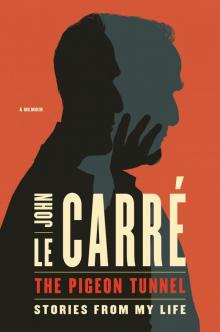 The Pigeon Tunnel: Stories From My Life
The Pigeon Tunnel: Stories From My Life Single & Single
Single & Single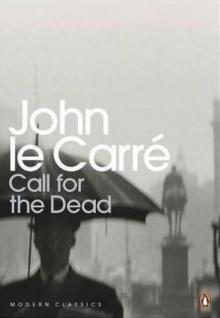 The Spy Who Came in From the Cold
The Spy Who Came in From the Cold The Looking Glass War
The Looking Glass War The Night Manager
The Night Manager A Delicate Truth
A Delicate Truth A Perfect Spy
A Perfect Spy The Little Drummer Girl
The Little Drummer Girl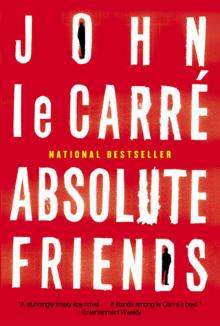 Absolute Friends
Absolute Friends A Murder of Quality AND Call for the Dead
A Murder of Quality AND Call for the Dead The Russia House
The Russia House The Tailor of Panama
The Tailor of Panama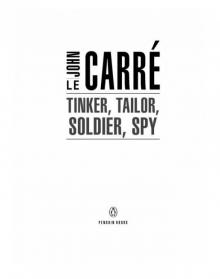 Tinker, Tailor, Soldier, Spy
Tinker, Tailor, Soldier, Spy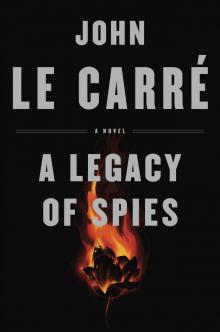 A Legacy of Spies
A Legacy of Spies The Mission Song
The Mission Song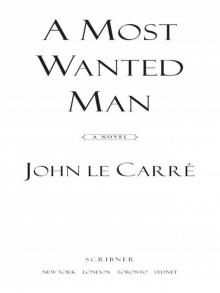 A Most Wanted Man
A Most Wanted Man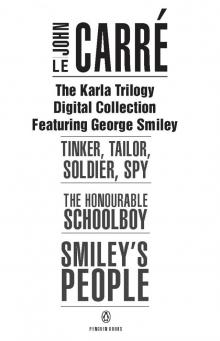 John Le Carré: Three Complete Novels
John Le Carré: Three Complete Novels The Secret Pilgrim
The Secret Pilgrim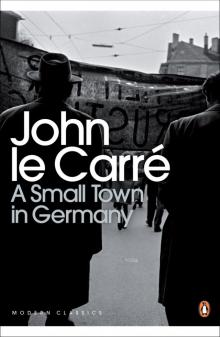 A Small Town in Germany
A Small Town in Germany A Murder of Quality
A Murder of Quality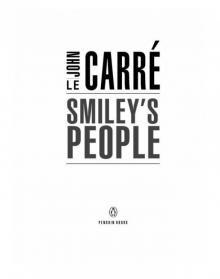 Smiley's People
Smiley's People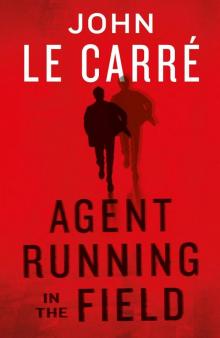 Agent Running in the Field
Agent Running in the Field The Spy Who Came in from the Cold s-3
The Spy Who Came in from the Cold s-3 The Pigeon Tunnel
The Pigeon Tunnel The Russia House - 13
The Russia House - 13 The Honourable Schoolboy
The Honourable Schoolboy Call For The Dead s-1
Call For The Dead s-1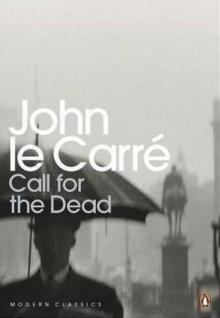 Call for the Dead
Call for the Dead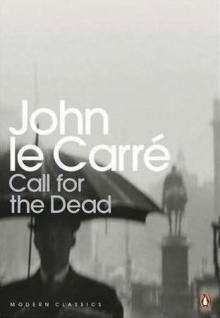 Call for the Dead - 1
Call for the Dead - 1